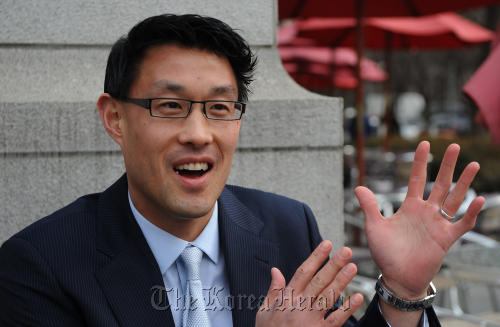Steven Kim picked by Korean government to teach his experience of jury system
The Korean justice system has come under fire after a slew of reports and several box office hits have highlighted corruption among judges and prosecutors.
So it comes as no surprise that government officials here would be interested in hearing about other judicial systems.
The government has invited a leading Korean-American prosecutor in the U.S. to discuss his extensive experience.
King County Senior Deputy Prosecutor Steven Kim flew from his home in Seattle, Washington to lecture Korean prosecutors and government officials on the U.S. jury trial system.
“The fact that they have me here talking about real jury trial experiences I think makes me believe that they are open to all ideas,” said Kim.
“They want to know how I prepare, what I look for in jury selection, how I conduct jury selection and then from opening statements to directs to cross examinations to closing.”
Although 37-year-old Kim modestly admits the Korean government’s request is daunting and overwhelming, Kim is well prepared for the task.
The Korean justice system has come under fire after a slew of reports and several box office hits have highlighted corruption among judges and prosecutors.
So it comes as no surprise that government officials here would be interested in hearing about other judicial systems.
The government has invited a leading Korean-American prosecutor in the U.S. to discuss his extensive experience.
King County Senior Deputy Prosecutor Steven Kim flew from his home in Seattle, Washington to lecture Korean prosecutors and government officials on the U.S. jury trial system.
“The fact that they have me here talking about real jury trial experiences I think makes me believe that they are open to all ideas,” said Kim.
“They want to know how I prepare, what I look for in jury selection, how I conduct jury selection and then from opening statements to directs to cross examinations to closing.”
Although 37-year-old Kim modestly admits the Korean government’s request is daunting and overwhelming, Kim is well prepared for the task.

As a top prosecutor in his county, Kim has been involved in over 100 jury-trial cases for the past 10 to 11 years and is fluent in Korean.
And at the Legal Research and Training Institute in Yongin, Gyeonggi Province, Kim will attempt to explain why Korea should adopt jury trials.
Korea’s system is an inquisitive one, as Kim explains, where prosecutors present the findings to a panel of judges and the judges decide the ruling. For high profile felonies including murder or rape, the judiciary system here will call upon a jury, but it acts only as an adviser to the judges.
But box office hits and scandals have justice officials here scrambling to regain public trust. “Unbowed” portrays authoritarian judges in a true story and “The Crucible” highlighted corruption among judicial officials in a case where teachers were found to be raping children with disabilities.
Another female prosecutor was found to have received a Chanel bag and a leased Mercedes-Benz in return for lobbying in cases and tipping court rulings.
Earlier this month, Seoul Central District Court officials’ attempt to gain public trust through an open forum turned into a court bashing session.
According to a recent survey by a legal watchdog, 77 percent of respondents believe the justice system here is unfair, which shocked Kim.
However Kim has spent his career practicing in an adversarial system where the court pits lawyers against prosecutors for the truth.
“We’re a system run by lawyers where lawyers argue with each other and somewhere in the middle the truth comes out,” said Kim.
And Kim made it no secret that he is a strong advocate of jury trials and an adversarial system.
“I’ve experienced the system and I’ve experienced, personally, that it works. I have seen it work and I’ve touched it, and it works,” he said.
“It is imperfect but the best.”
But Kim notes that he is learning as much about the Korean judicial system as Korean officials will learn about the U.S. system through the six months to a year he will spend lecturing here.
“It’s intriguing to them just like their system is intriguing to me” said Kim.
“I don’t know what’s going to come of this but when I got back home, I’m going to share this great experience.”
Kim will also hold lectures at law schools, including Dankook University.
However Kim notes that for Korea to implement a jury trial system at this point would be far from easy.
“I think it would be extremely difficult and it would be a very uphill climb,” said Kim.
“It would cost a lot of money, and the other challenge would be getting jurors to come and serve their civic duty.”
On top of that there is another flaw that the U.S. trial system holds: “It takes a long time,” he said. “I was trying a case when I left for Korea and its still pending,” he said.
A father of two, Kim is also excited to take in as much of the culture and provide positive Korean experiences to both his mother and his 3-year-old son, while his wife and daughter stay in the U.S.
“In the big picture I’m doing this for my son. I’m enrolling him in a Korean school and he already started taekwondo,” he said.
This will be Kim’s fourth visit to Korea, all of which were less than two weeks at a time, giving him a unique opportunity to learn about Korea as well.
By Robert Lee robert@heraldcorp.com">(robert@heraldcorp.com)
-
Articles by Korea Herald








![[Kim Seong-kon] Democracy and the future of South Korea](http://res.heraldm.com/phpwas/restmb_idxmake.php?idx=644&simg=/content/image/2024/04/16/20240416050802_0.jpg&u=)








![[KH Explains] Hyundai's full hybrid edge to pay off amid slow transition to pure EVs](http://res.heraldm.com/phpwas/restmb_idxmake.php?idx=652&simg=/content/image/2024/04/18/20240418050645_0.jpg&u=20240418181020)

![[Today’s K-pop] Zico drops snippet of collaboration with Jennie](http://res.heraldm.com/phpwas/restmb_idxmake.php?idx=642&simg=/content/image/2024/04/18/20240418050702_0.jpg&u=)